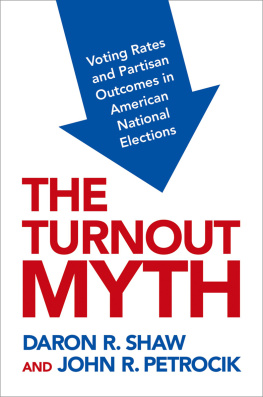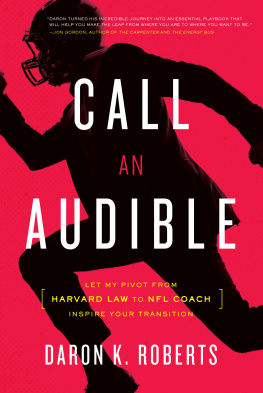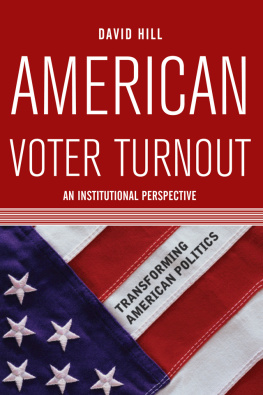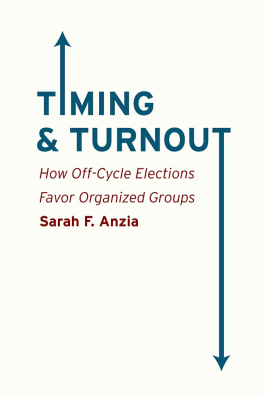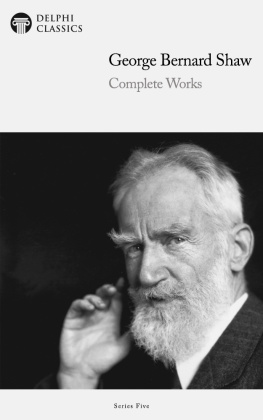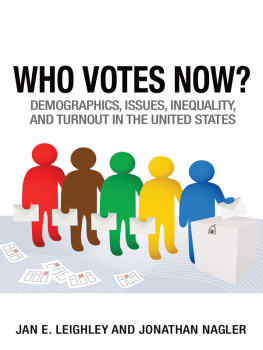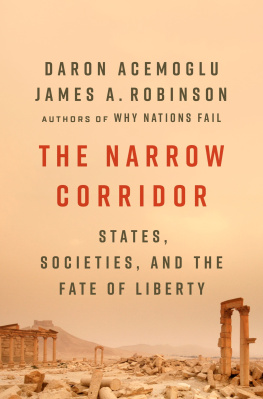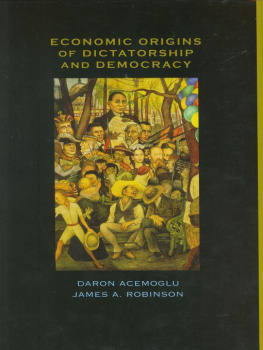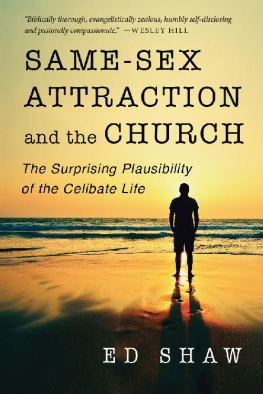Daron Shaw - The Turnout Myth
Here you can read online Daron Shaw - The Turnout Myth full text of the book (entire story) in english for free. Download pdf and epub, get meaning, cover and reviews about this ebook. year: 2019, publisher: OUP Premium, genre: Politics. Description of the work, (preface) as well as reviews are available. Best literature library LitArk.com created for fans of good reading and offers a wide selection of genres:
Romance novel
Science fiction
Adventure
Detective
Science
History
Home and family
Prose
Art
Politics
Computer
Non-fiction
Religion
Business
Children
Humor
Choose a favorite category and find really read worthwhile books. Enjoy immersion in the world of imagination, feel the emotions of the characters or learn something new for yourself, make an fascinating discovery.
- Book:The Turnout Myth
- Author:
- Publisher:OUP Premium
- Genre:
- Year:2019
- Rating:3 / 5
- Favourites:Add to favourites
- Your mark:
- 60
- 1
- 2
- 3
- 4
- 5
The Turnout Myth: summary, description and annotation
We offer to read an annotation, description, summary or preface (depends on what the author of the book "The Turnout Myth" wrote himself). If you haven't found the necessary information about the book — write in the comments, we will try to find it.
The Turnout Myth — read online for free the complete book (whole text) full work
Below is the text of the book, divided by pages. System saving the place of the last page read, allows you to conveniently read the book "The Turnout Myth" online for free, without having to search again every time where you left off. Put a bookmark, and you can go to the page where you finished reading at any time.
Font size:
Interval:
Bookmark:


Oxford University Press is a department of the University of Oxford. It furthers the Universitys objective of excellence in research, scholarship, and education by publishing worldwide. Oxford is a registered trade mark of Oxford University Press in the UK and certain other countries.
Published in the United States of America by Oxford University Press
198 Madison Avenue, New York, NY 10016, United States of America.
Oxford University Press 2020
All rights reserved. No part of this publication may be reproduced, stored in a retrieval system, or transmitted, in any form or by any means, without the prior permission in writing of Oxford University Press, or as expressly permitted by law, by license, or under terms agreed with the appropriate reproduction rights organization. Inquiries concerning reproduction outside the scope of the above should be sent to the Rights Department, Oxford University Press, at the address above.
You must not circulate this work in any other form and you must impose this same condition on any acquirer.
CIP data is on file at the Library of Congress
ISBN 9780190089467 (pbk.)
ISBN 9780190089450 (hbk.)
ISBN 9780190089481 (epub.)
Sidney Verba died in March 2019. His legacy includes a rich body of writing on the democratic order and generations of his graduate students who were inspired to make democratic politics a focus for their research and teaching. Petrocik, as Verbas graduate student, and Shaw, who studied with Petrocik, both owe somethingand Petrocik a great dealto Verbas commitment to better understanding the views and behavior of citizens, the processes of mass politics, and the institutions of Americas democracy. This book does not have the sweep of Sidneys writing, but we think he would appreciate our examination of a topical question about turnout. It is for that reason that we dedicate this book to Sidney Verba, scholar and intellectual with few peers.
this book was written to demonstrate that the belief that turnout has systematic partisan consequencesan idea that is widely embraced by social scientists (including our fellow political scientists), almost every member of the media, both party apparatuses, and our fellow citizens by virtue of what they hear from the mediahas a weak empirical foundation. In fact, we will state our conclusion even more strongly: there is no systematic or consistent partisan bias to turnout.
Having made that statement so unequivocally, we will also acknowledge that turnout can be consequential and has figured in the political strategy of many (most?) issue and candidate campaigns. Both authors know of initiatives and referenda where early strategy discussions dealt with when the matter should be put on the ballot because of what surveys indicated about the mood of the electorate. When the surveys indicated that citizens with the highest likelihood of voting supported a propositionwhile those who were less likely to vote opposed itproponents sought to place the proposition on the ballot when turnout figured to be low. Primaries of any kind and local municipal elections were always favorites for special issues (taxes, for example) when (a) opinion was divided between those most likely to vote and the others and (b) the core electorate supported the proposal that some groupparty leaders, public officials, an ideological interest group, union, or business sectorwanted to pass into law. On the other hand, on-year presidential elections were favored when those supporting the proposition believedusually because of survey datathat those least likely to vote were the core constituency for the initiative or referendum proposal. Sometimes the strategy worked, and those behind the proposal and the scheduling celebrated their insight and political savvy. On occasions when the scheduling strategy did not produce the desired outcome, the postelection rumination usually wondered why turnout was higher than expected (when it was) or so low (when it was), or, most commonly, the proponents blamed the poor quality of the strategists machinations or the relevant pollsters work. (It has been our experience that pollsters are often targeted for a disproportionate amount of recrimination.)
Turnout levels are also common aspects of strategies for partisan general elections, with lots of paid consultants selling ideas about how to register more of their most likely supporters and get them to the polls on Election Day. In an election where one side overwhelms the other with a get out the vote effort, turnout can make the difference. Usually, however, one side does not overwhelm the other. The election becomes something of an arms race in which GOTV on one side generates comparable efforts by the other. The result is usually a turnout stalemate. Of course, more generous absentee voting provisions and, even better, mail balloting for many or all increases a campaigns emphasis on strategies for getting their prospective supporters to cast a ballot. Despite the huffing and puffing about turnout strategies, however, most elections with a substantial GOTV dimension produce near-stalemates in turnout effects on the vote (albeit with more voters contributing). The results reported here may actually give rise to some of the new techniques that parties and consultants are exploring and exploiting to get their supporters to cast a vote.
However, this book is about the dynamics of the current status quo, setting aside approaches (some new, some causing concern) for registering the eligible, getting out the vote, and collecting ballots. We feel compelled to note that we do not have a partisan interest in this debate. We believe that the norms of citizenship expect citizens to vote, and we believe that every citizen has an obligation to vote. High-turnout elections confer a degree of legitimacy on the outcome of the election and all the resulting policy, a legitimacy that is diminished with a low rate of participation. We doubt that very high turnout, on the order of 90 percent or higher, is likely in this country, although it might be achievable with compulsory or nearly compulsory regulations. In reality, such compulsion is unlikely. In the short term, we encourage both parties to promote secure voting. We do not believe that it will work to the disadvantage of either.
as you might imagine, this project owes a great deal to many individuals. We wish to acknowledge the following people for providing useful feedback and, when appropriate, constructive criticism to the authors at public presentations or in private conversations: Joel Aberbach, Bethany Albertson, Ted Brader, Jim Campbell, Lindsay Dun, James Endersby, E. J. Fagan, Nadine Gibson, Colby Humphrey, Vince Hutchings, Gary Jacobson, Stephen Jessee, Bryan Jones, Karen Kaufmann, Cornelia Lawrence, David Leal, Eric McDaniel, Seth McKee, Mark McKenzie, Yul Min Park, Dennis Patterson, Tasha Philpot, Brian Richter, Brian Roberts, Larry Sabato, Tom Schwartz, John Sides, Bat Sparrow, Jamie Stokes, Sean Theriault, Nick Valentino, and Chris Wlezien. Early versions of the argument underlying this book were presented at meetings of UCLAs Center for American Politics and Public Policy, at department seminars of the University of Missouri and Texas Tech University, the annual meeting of the Midwest Political Science Association, the University of Michigans Interdisciplinary Workshop for American Politics, and the University of Texass American Politics Speaker Series; these were tremendous opportunities to develop our thinking on critical aspects of the project, and we appreciate the support of these organizations, their staff, and their members. We also wish to acknowledge our partners at Oxford University Press. Most notably, we thank our editor, David McBride, whose enthusiasm and patience toward the project has been invaluable. In addition, our gratitude extends to Holly Mitchell and Liz Davey, whose assistance with the text, tables, figures, and graphs was critical to helping us realize our final vision for the book. Last but not least, we bow in humble thanks to our respective families; without them, this book would not exist.
Font size:
Interval:
Bookmark:
Similar books «The Turnout Myth»
Look at similar books to The Turnout Myth. We have selected literature similar in name and meaning in the hope of providing readers with more options to find new, interesting, not yet read works.
Discussion, reviews of the book The Turnout Myth and just readers' own opinions. Leave your comments, write what you think about the work, its meaning or the main characters. Specify what exactly you liked and what you didn't like, and why you think so.

